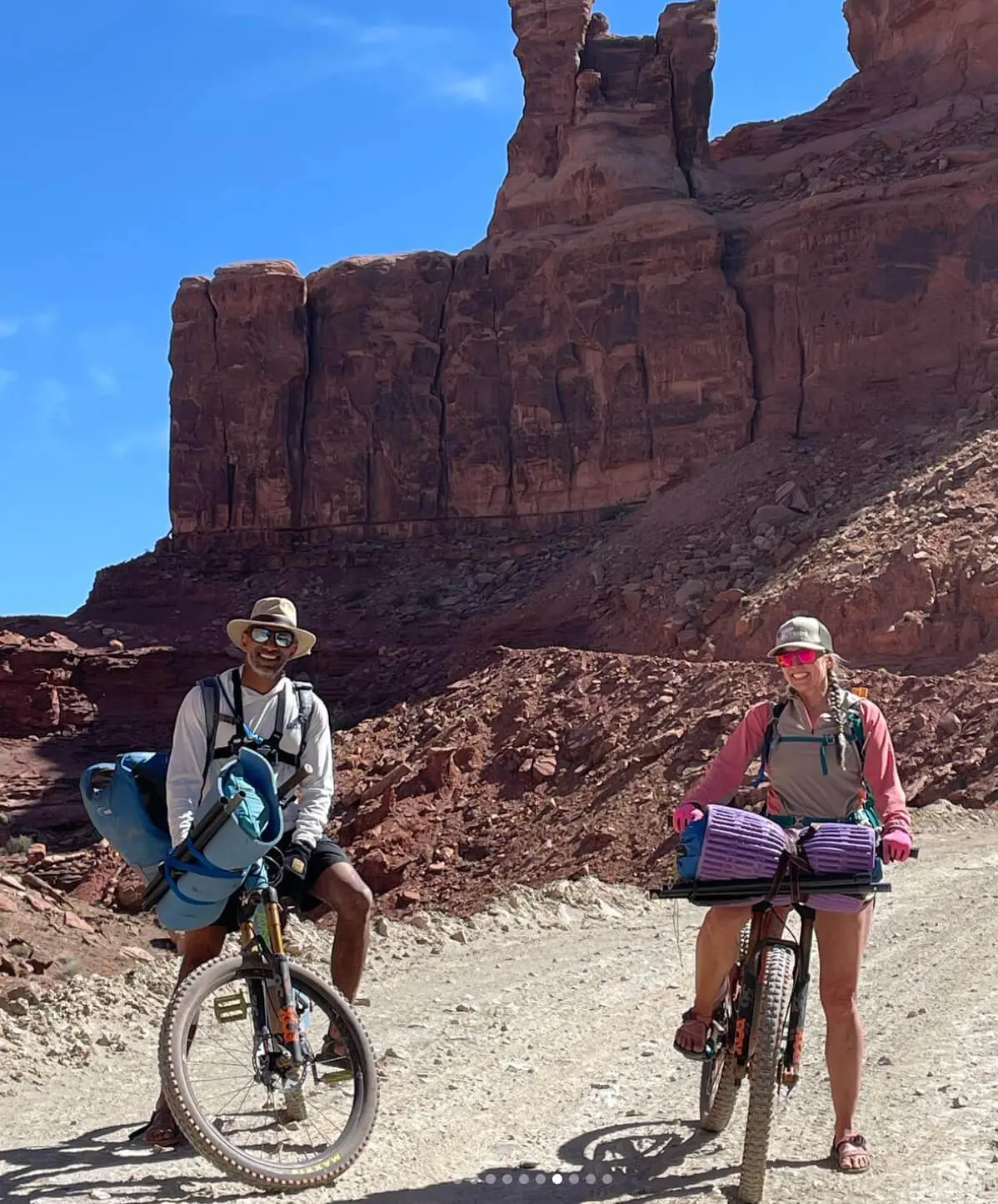Think scuba diving is just for extreme athletes? Think again. With the right gear and a little know-how, almost anyone can explore underwater worlds teeming with life. Scuba diving is actually one of the most accessible ways to experience the ocean – easier than holding your breath for freediving, and it can be less tiring than fighting surface currents while snorkeling. If you’re curious about beginner scuba diving but unsure where to start, you’re in the right place.
I’m Emma Desrochers – writer, diver, and full-time outdoor adventure chaser. My journey started when I was 19, snorkeling off the coast of Ecuador. That moment lit a spark. I soon found myself in Thailand, volunteering with a coral conservation nonprofit and getting my Open Water certification. That trip flipped a switch for me: diving wasn’t just fun – it was a way to support the ocean and protect what I love.
Since then, I’ve dived in Hawaii, Florida, and Thailand, earned my Advanced Open Water cert, and picked up an underwater camera to capture the magic. Along the way, I’ve learned a lot about what makes a good beginner dive (and what doesn’t), how to pick the right gear and guides, and why conservation matters in every dive we take.
This guide to scuba diving for beginners breaks it all down – certifications, safety tips, common myths, choosing gear, and the best beginner-friendly dive destinations. Whether you’re testing the waters or ready to fully send it, this is your go-to resource to dive in with confidence.
Let’s dive in!

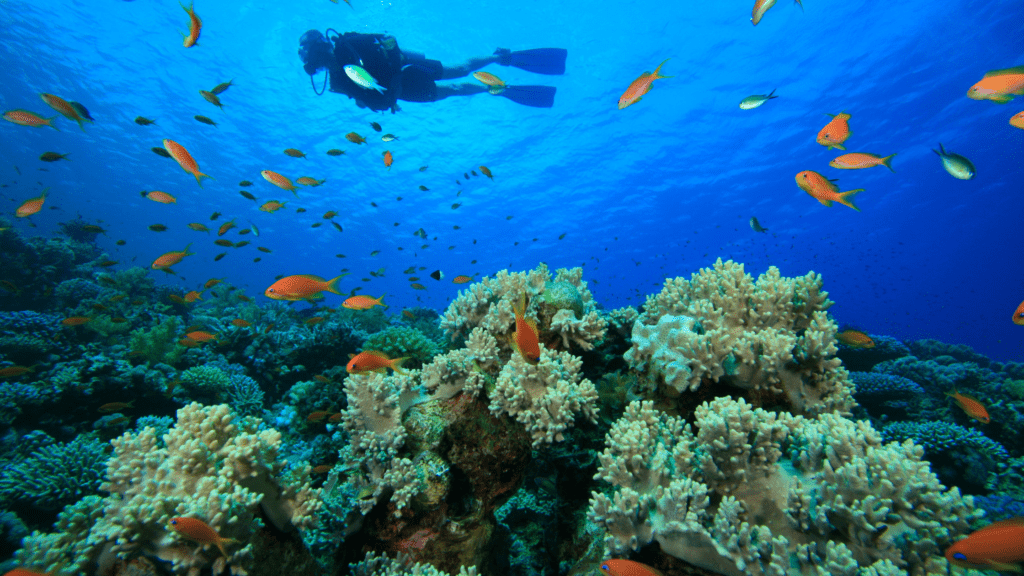
Reasons to Get Into Scuba Diving
Scuba diving opens the door to experiences few people get to enjoy—like swimming alongside lively coral reefs, swimming through shipwrecks, or spotting marine life most folks only see on TV. It’s not just about the adventure, though; diving offers a sense of peace and mindfulness, as the underwater world surrounds you with tranquil silence, broken only by the sound of your own breath. Plus, it’s a great way to challenge yourself, stay fit, and connect with a global community of divers. Whether you’re a beginner looking to scuba dive to explore new ecosystems, conquer a fear, or simply try something new, diving offers endless opportunities to expand your horizons—and have a blast doing it.
Health Benefits of Scuba Diving
Scuba diving is surprisingly relaxing, requiring minimal physical effort while offering a host of physical and mental benefits. Swimming through coral reefs or gently navigating currents helps build core and leg strength, but it’s the mental side of diving that truly shines. The underwater world, with its muffled sounds and steady focus on breathing, creates a sense of calm unlike any other. Diving also taps into our natural curiosity and love for exploration. Once certified, the world becomes your playground—whether it’s drifting through tropical reefs in Mexico, exploring the vibrant waters of Indonesia, or braving the icy depths of Alaska. Each dive, no matter where it takes you, promises a unique adventure with new discoveries waiting at each new dive site.

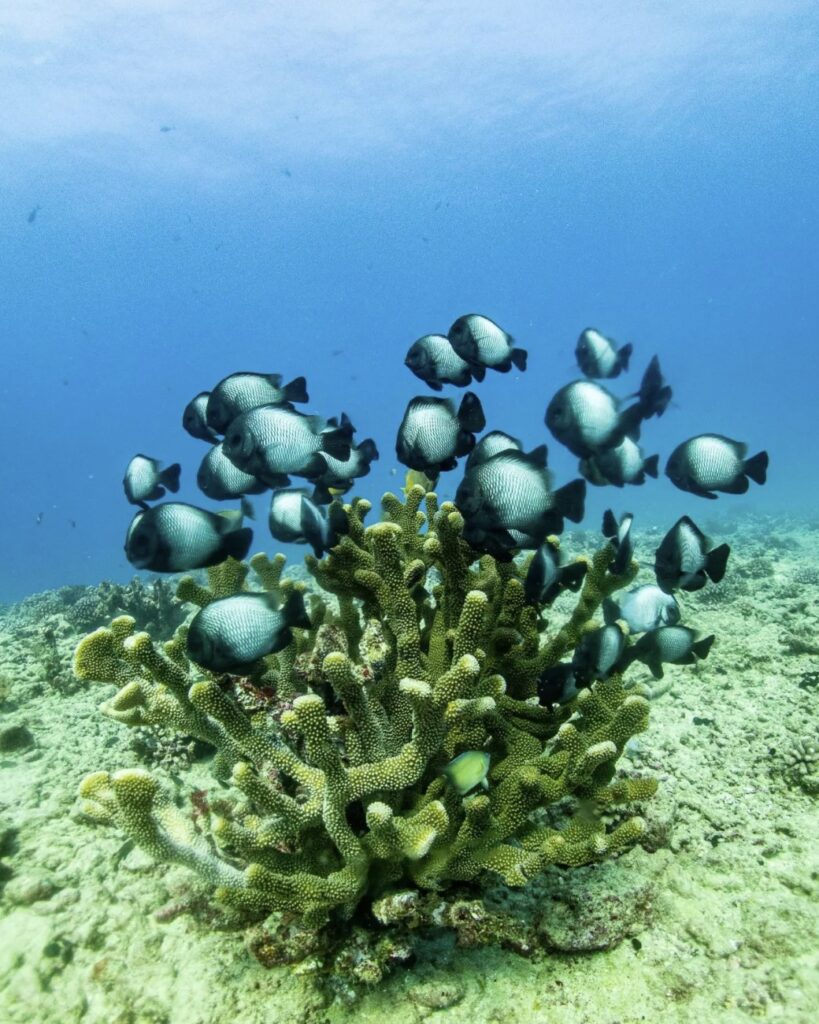
Debunking Common Scuba Diving Myths
Many beginners to scuba diving are scared off by various myths, such as the misconception that it’s dangerous, requires extreme athleticism, or is too expensive. Let’s debunk some of these myths, because with the right training and support, scuba diving is a safe, approachable adventure that almost anyone can enjoy.
- Myth #1 – Sharks Are Dangerous: Shark attacks on divers are extremely rare. Sharks are generally uninterested in humans, and many divers consider it a privilege to encounter them. Most attacks happen when humans resemble prey, which is more common with surfers and snorkelers. In fact, sharks often avoid attacking if they’re being watched, and leading shark researchers suggest staring them down as they approach to dissuade them from coming closer.
- Myth #2 – Scuba Diving Is Dangerous: Scuba diving is an adventure activity, therefore it has risks, but they can be minimized and managed through proper training and protocols. All certified divers learn essential safety skills, such as how to handle equipment, monitor air supply, and manage buoyancy. When done responsibly and with trained professionals, diving is statistically safer than activities like skiing or horseback riding.
- Myth #3: Scuba diving requires extreme athleticism: You don’t need to be an elite athlete to scuba dive. Scuba diving is more about technique than raw physical strength, and it requires only moderate fitness. Most of the physical work, like swimming and controlling your buoyancy, is supported by the equipment, making it accessible to a wide range of fitness levels.
- Myth #4: Scuba diving is too expensive: While there are upfront costs for training and gear, scuba diving can be surprisingly affordable. Many dive centers offer equipment rentals and discounted packages, especially in popular dive destinations. Additionally, certifications are lifelong, so once you’re certified, you can dive almost anywhere without ongoing costs.
- Myth #5 – Divers Breathe Pure Oxygen: Most divers breathe regular air (21% oxygen, 78% nitrogen). Those certified for enriched air (nitrox) use higher oxygen levels, usually between 28% and 36%.
- Myth #6 – Scuba Diving Is Only for Tropical Waters: Scuba divers can explore anywhere there is a body of water that is safe to swim in. It can be the cold waters in Europe or Alaska all the way down to the tropical waters of Indonesia or the Philippines. It is also common in both freshwater lakes and saltwater oceans, as well as many other bodies of water such as marshes, rivers, and caves.
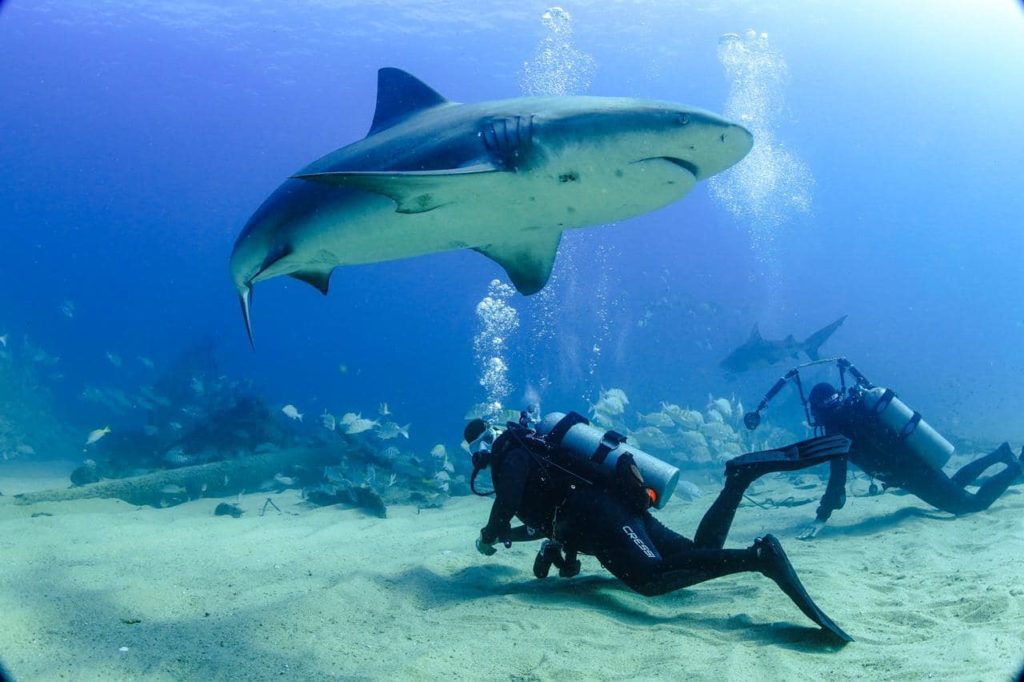

Getting Scuba Certified
We highly recommend that beginners to scuba diving get their scuba certification before taking any dives. Getting certified helps to keep yourself and others safe, prepared, and confident. A certification means you’re allowed to dive at most destinations, as many dive shops and destinations require a certification for legal and insurance reasons. Certification also promotes responsible diving, helping to protect marine environments.
When choosing a certification path, consider your goals. Most divers pursue recreational diving, which allows you to dive for fun up to the depth limit of your certification. A professional track certifies you to become an instructor, while a technical track allows for more advanced diving, such as cave diving, deep diving, or using specialized gasses.
Here’s a breakdown of the levels of scuba diving certifications:
- Discover Scuba Diving: A beginner scuba diving experience, not required but helpful to see if you enjoy diving before committing to certification.
- Open Water Diver: The entry-level certification, allowing you to dive up to 60 feet (18 meters) with a buddy.
- Advanced Open Water Diver: Builds on the Open Water certification, extending your depth limit to 100 feet (30 meters).
- Rescue Diver: Trains you to handle underwater emergencies and provide first aid if needed.
- Divemaster: The first professional level, qualifying you to guide and certify other divers.
Beyond these core certifications, divers can also pursue specialties like drift diving, enriched air (nitrox), deep diving, wreck diving, cave diving, and more, focusing on honing specific skills. This certification progression takes you from beginner to professional, allowing for deeper, more technical, and more specialized diving experiences.
Choosing a Dive Instruction Agency
There are three leading scuba diving certification agencies that offer scuba training programs, each providing structured courses to ensure safe diving practices. You’ll need to choose one based on your preferences for learning style, course flexibility, and cost, as they all issue globally recognized certifications. When choosing a dive certification agency, it’s important to research your options. The three major agencies are:
- PADI (Professional Association of Diving Instructors): The largest and most recognized certification agency worldwide. PADI is known for its standardized, modular training that focuses on recreational diving, making it easy to continue your education anywhere in the world.
- NAUI (National Association of Underwater Instructors): The second-largest agency, primarily focused in North America. NAUI emphasizes education, safety, and instructor flexibility, allowing for additional skills and training if needed. However, it may not be as widely recognized internationally as PADI.
- SSI (Scuba Schools International): Another major agency with over 3,000 dive centers worldwide. SSI offers flexible course structures and places a stronger emphasis on professional and technical diving.
How to Get Your Scuba Diving Certification
Ready to get certified? Here’s how:
- Pick an Agency: Your choice might depend on your location or where you plan to get certified. Agencies differ in costs, so factor this into your budget.
- Choose a Dive Shop: Ensure the shop and instructor are certified by your chosen agency by verifying the instructor’s certification number. Meet the instructor ahead of time to ensure a good fit with their personality and teaching methods; Some are more laid-back, letting you skim through the lessons, while others teach more in depth. You need to be comfortable enough to ask questions, never shy away from asking questions when you aren’t sure or are concerned about an action professionals are taking.
- Review Costs & Time Commitment: Scuba diving certifications for beginners takes several days and dives, so make sure you have time to complete the necessary coursework and tests before your dives.
- Consider Referral Options: With a referral course, you can complete the academic and confined water portions of your certification at one location and finish the open water dives at another (e.g. complete your first two confined water dives at your local dive shop in Minnesota, and the two regular dives on vacation in Hawaii). This is ideal for students who want to handle initial training at home and save their open water dives for a destination with better diving conditions. PADI, NAUI, and SSI all offer this flexible option, and divers generally have up to 12 months from the date they finish the academic and confined water portions to complete their open water dives at another location. However, it’s recommended to finish the dives sooner rather than later, as retaining the skills and knowledge is crucial.


What to Expect When Getting Scuba Dive Certified
The structure of scuba diving certification courses offered by PADI, NAUI, and SSI is quite similar, as they all follow international standards to ensure divers are trained consistently across the board. Here’s a general breakdown of what beginners to scuba diving can expect:
- Scuba Diving Theory:
- This portion covers key topics like dive physics, safety, and dive planning. It can be completed online at your own pace or in a classroom setting.
- PADI and SSI offer e-learning options; PADI’s course materials typically require a fee, while SSI offers free online theory learning through its app. NAUI, on the other hand, blends classroom and online sessions to ensure a comprehensive understanding.
- Confined Water Sessions (Practice Dives):
- These sessions are conducted in pools or shallow, controlled environments to help students practice fundamental skills, such as mask clearing and buoyancy control. Instructors supervise closely to build confidence.
- Open Water Dives:
- To complete the certification, students must perform four open water dives over two days, typically reaching depths of up to 18 meters (60 feet). These dives allow students to apply their skills in real-world conditions under the guidance of an instructor.


Choosing the Right Scuba Gear: Buy vs. Rent
Scuba diving gear can be pricey, but it’s possible to participate on a budget. As a beginner to scuba diving, it’s generally not recommended to buy your own gear immediately due to the overwhelming variety of equipment options and features. Instead, focus on getting certified and diving with various types of rented gear before deciding what to purchase.
Most dive shops offer rental gear, often included in the price of a dive tour. If you only dive occasionally with a shop, renting is a practical option. However, if you plan to dive frequently with just a buddy or explore more advanced locations, investing in your own gear might be worthwhile. Owning gear ensures you control its maintenance and are confident it’s in good working order. Always triple-check rental gear before diving to ensure its complete and functioning properly.
Here’s a basic checklist of essential scuba gear to start your diving journey:
- Mask
- Snorkel
- Fins
- Dive Computer
- BCD (Buoyancy Control Device)
- Regulator Set (First Stage, Octo, Second Stage)
- Wetsuit/Drysuit (depending on location and water temps)
- Tank
- Weights
Additionally, consider these items to enhance safety and comfort:
- Knife/Shears
- Defog Solution
- Booties, Gloves, Hoods
- Dive Flag/Marker Buoy
- Chapstick/Vaseline (for mask seal if you have facial hair)
- Dive Lights
- Dive Logbook
- Diver Insurance
Dive flags depend on the local laws and regulations but you should use them any time divers are in the water whether scuba divers, freedivers, or snorkelers to let watercraft know you are there. The red and white “diver down” flag is common in the U.S. and Canada, while the blue and white alpha flag is internationally recognized. A float flag should be around 12 x 12 inches or larger so it can be seen from a distance.
Key Considerations & Gear Maintenance
Before purchasing gear, consider your diving goals and try out different equipment. Some examples of questions to ask yourself before buying gear are:
- Will you dive in warm tropical waters or colder environments?
- Are you aiming for professional diving or specialized areas like wreck or cave diving?
- Have you tried different BCD types (e.g., backplate and wing vs. jacket BCD)?
- Do you prefer integrated regulators or separate hoses?
There is no single answer for everyone, as each person has specific needs to fit their diving. Starting with a well-fitting mask, a wetsuit (if needed), and a dive computer is recommended, as a misfitting mask or unfamiliar dive computer can lead to an uncomfortable or unsafe dive.
If you’re ready to buy, consider used gear as a budget-friendly option. Regulators are durable and can be repaired, but make sure your dive shop services the brand. When buying a used BCD, check for leaks by spraying water on the inflated BCD and looking for bubbles. Buying tanks is only necessary if you need a specific size or plan to dive at remote sites; otherwise, it’s easier to rent tanks while traveling due to difficulty in flying with them.
Finally, proper maintenance is critical. Tanks need a visual inspection (sticker) annually and a hydrostatic inspection every 3 to 5 years (check the date carved on the tank). Regulators and BCDs should be serviced every 80 to 100 dives or 1 to 2 years, or as outlined in the manual. When buying new, ensure you read the manual and keep up with the servicing in order to keep the warranty on the gear. For used gear, get it serviced before your first use to ensure safety. Check out Scuba.com for new and used gear options!



Health & Safety Considerations
To ensure safe scuba diving, start by reviewing the DAN Medical Participant Questionnaire. This widely used form, developed by medical and scuba professionals, evaluates your ability to dive safely, covering key health areas such as heart, lung, and brain conditions, surgeries, medications, and ear/nasal/sinus issues. If any concerns arise, your physician may need to review and approve your fitness to dive.
The minimum age to get scuba certified is 10 years old in most areas. Divers under 15 are certified as Junior Open Water Divers, and their certification can be upgraded to an Open Water Diver at 15 years old. Parental permission is required, and the dive master will assess the child’s maturity and comfort in the water before certification.
While scuba diving can be safe, it takes place in an underwater environment with specific risks. You breathe compressed air, which increases nitrogen and carbon dioxide levels in your blood, and greater depths cause pressure changes that affect your body. In case of emergencies like asthma or heart attacks, providing immediate medical assistance underwater and/or on the dive boat is challenging, making it crucial to address any health issues beforehand.
Two common medical concerns are diving with asthma and pregnancy. Diving while pregnant is discouraged due to a lack of research on the effects of diving at depth. Asthma presents a more complex issue, as breathing cold, dry, compressed air can trigger an asthma attack underwater, which is dangerous since you may not be able to safely ascend quickly. Many people with controlled asthma can dive, but it depends on the type of asthma, dive conditions, and your doctor’s opinion.
You don’t need to be an Olympic swimmer to scuba dive, but you should be comfortable in the water, able to tread or float, and swim a certain distance to pass certification tests and handle returning to boats in strong currents.
Dive / Travel Insurance
Scuba diving is an unforgettable way to explore the world – but like any adventure sport, it comes with risks, especially when you’re traveling internationally. Medical costs for dive-related incidents can be high, and many standard travel insurance policies don’t cover them. We recommend checking out DAN (Divers Alert Network) – they’ve been the trusted leader in dive safety and trip insurance for decades, with plans built specifically for divers.
Specific Scuba Diving Risks
While scuba diving risks can be minimized with proper training, divers should be aware of three major hazards: decompression sickness, nitrogen narcosis, and oxygen toxicity.
- Decompression Sickness (“the bends”): This occurs when nitrogen absorbed by the body under high pressure forms bubbles during a rapid ascent. At depth, increased pressure dissolves more nitrogen in body tissues, and ascending too quickly prevents it from safely leaving the body. Nitrogen bubbles can block blood vessels, causing joint pain, rashes, paralysis, respiratory issues, and in severe cases, death.
- Nitrogen Narcosis: Occurring at depths over 30 meters (100 feet), nitrogen becomes more soluble in the brain, producing an intoxicating effect similar to alcohol. While not directly harmful, nitrogen narcosis impairs judgment, making it difficult for divers to make sound decisions, read gauges correctly, or follow safety protocols, increasing the risk of accidents.
- Oxygen Toxicity: Breathing high concentrations of oxygen at elevated pressures, especially when using enriched air (nitrox) or pure oxygen, can lead to toxic reactions in the body. This can cause convulsions, visual disturbances, and lung damage. Oxygen toxicity is particularly dangerous at depths over 6 meters (20 feet) or when diving deep with oxygen-rich gas mixtures, as convulsions underwater can result in drowning.

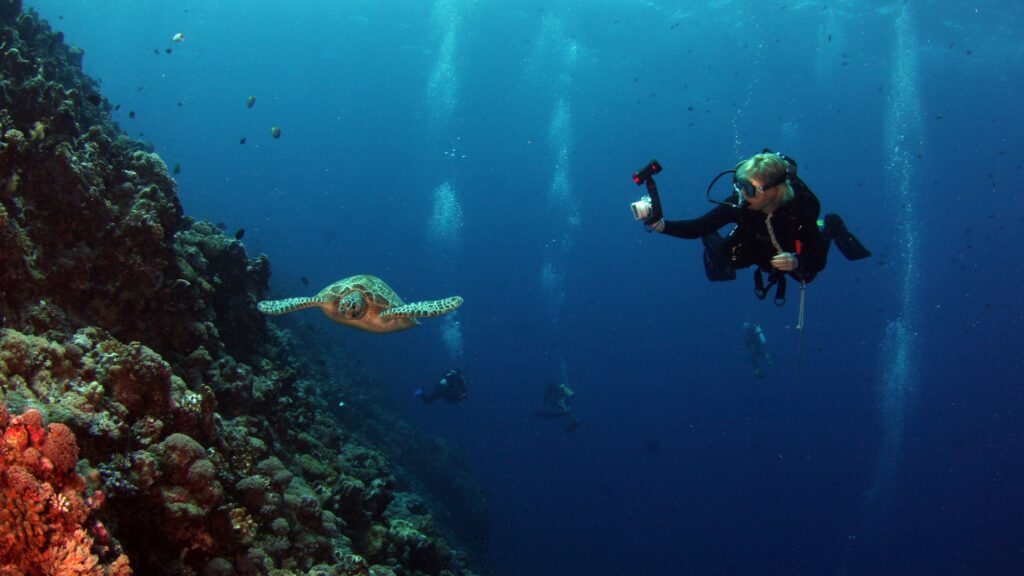
Understanding the Underwater Environment & Leave No Trace Scuba Diving
As scuba divers, we love examining and exploring the underwater environment, but it’s crucial to practice Leave No Trace (LNT) principles – “take pictures, leave only bubbles.” This mindset not only fosters appreciation for the ecosystem but also prioritizes our safety while diving.
Understanding basic navigation and underwater currents is vital for a successful dive. When you’re close to shore, pay attention to waves and undertows that can throw you against sea cliffs or quickly shift you to shallow sand areas. Always familiarize yourself with the dive site ahead of time, including any potential rip currents that may pull you out to sea. It’s essential to dive within your certification limits regarding depth and experience level to ensure your safety.
Regarding the ecosystem, always keep your hands to yourself, especially in unfamiliar environments. Many marine creatures can be venomous, and it’s important to avoid chasing or harassing wildlife – wildlife can become dangerous when they feel threatened. Instead, enjoy the thrill of watching as marine life passes by and take some pictures, but remember to respect their space – you are a guest in their home. Additionally, coral is a living organism – never touch it and be extra careful with your fins when swimming. Maintain a respectful distance from reefs to avoid hitting them, as doing so can destroy something that took centuries to grow. When navigating through tight swim-throughs, be cautious; it’s difficult to gauge your tank’s position on your back, which can lead to becoming stuck or inadvertently damaging delicate ecosystems with your gear.
Be aware of rusting wrecks underwater, as saltwater can quickly decay shipwrecks and plane wrecks. These deteriorating structures can pose risks, such as cuts from sharp edges, and damaging them can ruin valuable habitats that serve as reefs for other marine life. We want to preserve these underwater structures for future divers to enjoy while recognizing their ecological importance.
To contribute positively to the marine environments that we cherish, consider participating in cleanup dives hosted by many dive shops, aimed at removing trash from underwater areas. Additionally, check out (and consider donating to, or volunteering with) scuba diving non-profit organizations dedicated to marine conservation. By taking part in these initiatives, we can help protect and preserve the underwater world, ensuring it remains vibrant and safe for future generations to explore.
Diving Conservation Spotlight: Reef Environmental Education Foundation (REEF)
At TripOutside, we believe that outdoor adventure and conservation go hand in hand—which is why we’re proud to feature REEF, an international marine conservation organization implementing hands-on programs to involve local communities in conservation-focused activities.
Who They Are & Where They Work
The Reef Environmental Education Foundation (REEF) is a nonprofit marine conservation organization founded in 1990 by divers and marine enthusiasts concerned about the health of the ocean. Based in Key Largo, Florida, with staff across several U.S. states, REEF’s mission is to protect biodiversity and ocean life by actively engaging and inspiring the public through citizen science, education, and partnerships with the scientific community.
REEF operates globally, with programs in coastal areas of North and Central America, the Caribbean, Eastern Atlantic and Mediterranean, Hawaii, the South and Indo-West Pacific, Indian Ocean, and Red Sea. REEF comprises a dedicated team of scientists, educators, and volunteers passionate about marine conservation. Their work is supported by a network of over 17,000 volunteer divers and snorkelers who contribute to various programs and initiatives.
How You Can Support
- Become a Member: Joining REEF is free and open to anyone interested in marine conservation. Members receive newsletters, access to educational resources, and opportunities to participate in programs.
- Participate in Surveys: Divers and snorkelers can contribute to the Volunteer Fish Survey Project by conducting surveys during their dives and submitting data to REEF’s database.
- Attend Events: REEF hosts various events, including workshops, seminars, and the annual REEF Fest, providing opportunities for education and community engagement.
- Donate: Financial contributions support REEF’s ongoing conservation and education efforts.
- Shop: Purchasing merchandise from the REEF store helps fund their programs.
Scuba Diving FAQs
How long does scuba diving certification last?
Once you earn a scuba diving certification, it is valid for life and does not expire. However, if you’ve been inactive for a long time (generally six months to a year), agencies like PADI recommend taking a refresher course to brush up on your skills.
How much is scuba diving certification?
The cost for an Open Water certification typically ranges from $300 to $600, depending on the location and dive center. Additional fees may apply for online learning materials or equipment rentals.
Where can I get my scuba diving certification?
You can get certified through dive shops, resorts, or certified instructors affiliated with agencies like PADI, NAUI, or SSI. Search for dive centers near you or in popular dive destinations for both classroom and open water components.
What are the two most prominent scuba diving certification associations in the world?
The two most prominent scuba certification agencies are PADI (Professional Association of Diving Instructors) and SSI (Scuba Schools International), both recognized globally and offering similar courses.
How long does it take for a beginner to get a scuba diving certification?
It usually takes 3 to 4 days to complete an Open Water Diver course, though the timeline can vary depending on whether you complete theory online or take classes in person.
Which is the best scuba diving certification?
There isn’t a single “best” certification; PADI, NAUI, and SSI all follow international standards and offer similar core training. The best choice depends on personal preference, course availability, and learning style.
What is the most common scuba diving certification?
The PADI Open Water Diver certification is the most popular worldwide, serving as the entry-level certification for recreational diving.
What can you do with a scuba diving certification?
With a scuba certification, you can dive independently with a buddy, rent equipment, and join dive tours. You can also pursue advanced or specialty courses like night diving, wreck diving, or underwater photography.
How old do you have to be to get a scuba diving certification?
Most agencies require divers to be at least 10 years old to start an entry-level course like Open Water Diver. There are junior certifications available for younger divers with depth and supervision limits.
What are the levels of scuba diving certification?
Scuba certifications follow a progression: Open Water Diver, Advanced Open Water Diver, Rescue Diver, and Divemaster or Instructor levels. Specialty certifications (e.g., wreck diving or Nitrox) are also available along the way.
Ready to Dive In: Take the Plunge!
In wrapping things up, scuba diving opens up an incredible world beneath the waves, but we get it—this whole process can feel a bit overwhelming at first. If you’re still unsure if diving is for you, why not try a Discover Scuba Dive? It’s a fun way to dip your toes in and see how you enjoy it without getting into the full certification just yet. From there, you can explore certification options using our process detailed above. Remember, booking your scuba tours and certifications is easy with TripOutside. We curate our partners to ensure you have a seamless, safe and enjoyable diving experience. So why wait? Start your underwater adventure today!
Think snorkeling is more up your alley? Check out our Snorkeling for Beginners article to learn more!
Transparency matters: Some links on this page are affiliate links, which means we may earn a small commission if you buy gear through them – at no extra cost to you. We only recommend products we genuinely trust and use ourselves.
You’ll also see links to our vetted TripOutside guide and outfitter partners – these human-powered adventures are handpicked by our team and are part of our core mission to make outdoor exploration easier and less impactful on ecosystems, while supporting conservation to protect the wild places we love. Your support through both types of links helps keep TripOutside ad-free and independent – so you can spend less time researching and more time out there adventuring.


